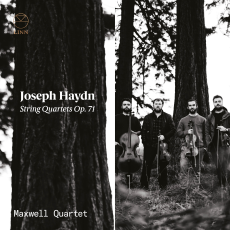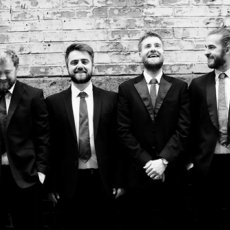Maxwell Quartet - Haydn: String Quartets Op. 71 - MusicWeb International
Following each of the three Op.71 quartets with a seemingly random selection of Scottish fiddle tunes might serve to remind us of the Maxwell Quartet’s self-proclaimed roots - “four close friends who grew up playing classical and folk music together in youth orchestras and music schools across Scotland” - but what musical purpose it serves escapes me. There is a very good case to be made for linking Haydn with Scottish music; during his visits to England he corresponded with George Thompson in Edinburgh from whose collection of Scottish Songs Haydn harmonised 150. But none of these is included here. Indeed, most of the fiddle tunes on this disc date from long after Thompson’s collections of the 1790s. Only one musical link is identified in the booklet notes – The Rosebud of Allenvale, by the famous Scots fiddler, James Scott Skinner, which follows on from Op,71 No.2 “begins with the very same figure as Haydn’s Finale” – otherwise it seems the sole purpose in appending Scots fiddle tunes to Haydn string quartets is to give a distinct Scots brogue to a disc of music which very much is the property of the international musical community. Such localising of great music works incredibly well in concert – and I’d be the first to cheer such juxtapositions to the rafters were they to be presented in concert near my Fife home – but sitting in my Singapore office listening to it on CD, it seems more than pointless; it verges on the ridiculous.
There are plenty of enthusiasts willing to buy a handsomely-presented and beautifully-recorded disc of Scots fiddle music arranged for string quartet, and certainly there are plenty who would be in the market for such clean and perceptive recordings of Haydn’s Op.71 quartets, but I doubt whether the two markets overlap sufficiently to make this an attractive proposition for either. Some of that confusion of target audience is highlighted by the group photograph in the booklet. As if they were a folk group doing the rounds of Glasgow pubs, they look to be standing in a gents’ toilet (with the graffiti on the walls clumsily photo-shopped away), but like a professional string quartet, they are wearing white shirts, ties and formal evening jackets.
The Maxwell Quartet, whose debut disc this is, comprises four bearded men whose individual images, closely photographed in black and white for the booklet, are so similar as to make them virtually indistinguishable from each other. That, however, is the perfect metaphor for their playing, for there is a unity of purpose, an uncannily single-mindedness of approach and an innate interpretative focus which transcends the merely comradely. If someone told me that the same person was playing all four instruments and the recording achieved through the use of multi-layering I would not in the least be surprised. There is not a hint here that there is any individuality in this totally corporate approach to the Haydn quartets. The delicately skipping Minuet and its oddly sliding Trio of Op.71 No.2 takes collective interpretation and performance to a wholly new level. Interestingly, with a few delightful 1st violin skips towards the end of this Minuet and a wonderful elasticity of timing in the Finale, one begins to see why they identified a certain Scots character in Haydn’s writing. You might even begin to believe that Haydn was a closet Caledonian.
Performances of neither of the other Op.71 quartets is any the less superb in the collective approach and corporate zeal of the Maxwells, but Op.71 No.2 is certainly their real pièce de resistance here, with No.1 and No.3 both delivered in a direct and neat way, highly impressive in its own right, but lacking the distinctive interpretative character of No.2. In short, this is a recommendable performance of the Op.71 quartets with that of Op.71 No.2 standing out from the crowd. But what if Scots fiddle music is not for you? Is it worth simply ignoring the intervening tracks?
While the answer is undoubtedly yes, I would recommend that even the most anti-Alban make the effort to hear the Maxwell’s dance and skip their way through the tunes of their collective homeland. It’s as if a remarkable transformation comes over them; a transformation which seems to cast a shadow over their Haydn performances. After, for example, their breathless scurry through Skinner’s The Hurricane, something of that frenzied energy persists into a breezy account of the opening vivace of Op.71 No.3. Beyond real or imagined cross-fertilization of moods and characters, there is also the very distinct sound they bring to the Scots tunes. Gone is the neat, polished, totally unified quartet sound of Haydn and in its place the almost spirit-infused enthusiasm of the ceilidh-band, the violins turning themselves into fiddles and the lower strings taking on a percussive edge which gives everything a tremendous dancing impetus. And nobody should miss out on their intensely beautiful epilogue, the lament, Griogal Cridhe (“Beloved Gregor”), said to have been sung by Lady Marion MacGregor when she set eyes on the severed head of her husband, Gregor MacGregor, decapitated by the Campbells at Balloch Castle in April 1570. In any context, this is one of the most moving things any string quartet has committed to disc.
So does this weird mixture of Haydn quartets and Scots fiddle tunes work as a single CD release? It certainly does not give any greater insight into Haydn’s music, nor does it trace realistic musical links between these disparate styles, but it does give a distinctive flavour to performances which on any terms are well worth hearing. And whatever music they play, the Maxwell’s never fail to impress with their total assimilation of the idiom.

